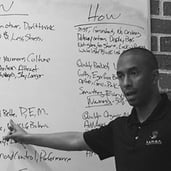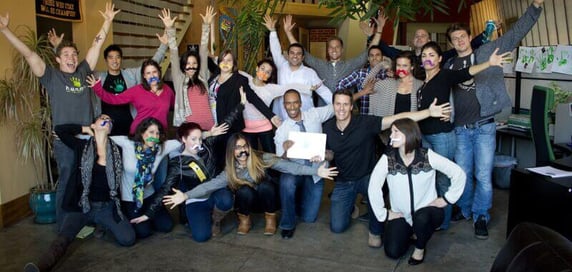 Kevin Dorsey is a fantastic sales leader. As Head of Sales for SnackNation, he leads a team of 12 Sales Development Reps and 30 Account Executives. SnackNation offers office delivery of healthy snacks that create happier and more productive teams.
Kevin Dorsey is a fantastic sales leader. As Head of Sales for SnackNation, he leads a team of 12 Sales Development Reps and 30 Account Executives. SnackNation offers office delivery of healthy snacks that create happier and more productive teams.
In just one year, Kevin grew the teams from a handful of reps to over 40. Along the way, he decided that the best avenue for reinforcing and scaling critical sales competencies was to build a Sales Playbook.
And over the next 3.5 months, he did just that.
Lesson #1: He immersed himself in his SDRs' process
"I knew that if I wrote the Playbook from behind my desk exclusively, it probably wouldn't be very good."
Kevin got his hands dirty, getting in the seat with the SDRs and really seeing what that day-to-day felt and sounded like. He was looking to combine emergent best practices (identified by his team) with industry and thought leaders learnings.
The playbook is broken into three sections:
- What do we need to know about our customers to help them succeed?
- What must every single SDR be able to do well?
- What data / technologies do we need to effectively execute?
Lesson #2: He started with the most important piece- The Why
"My favorite part of the playbook is the why section. I really tried to explain to new hires why we do certain things the way we do."
Right up front, the playbook lays out the thinking behind how SnackNation reps execute. Kevin shares what mistakes have already been made and lessons learned along the way. Most companies direct their teams on how to go after deals, but rarely share the why.
Kevin’s team knows the why, they believe in it, and mostly importantly they can teach it to others.
Lesson #3: He got his team involved
"When I finished a chapter, I presented it to the team. I said, 'Tear this apart. Tell me where I'm wrong. Tell me what's off that doesn't work in real life.' Getting the team involved builds ownership."
After the 3.5 month initial writing period, Kevin continues to revise the playbook monthly. He makes updates for each new hire class. His goal is to make the previous SDR class jealous - to the point where they're saying, "Man, I wish I had all this when I started."
Equal to what goes in the playbook is how you communicate it. You have to put everything in a format that reps can absorb. Even the best writing, if presented as a wall of words, won't help your reps learn and grow.

Sales teams need playbooks to make the most of every single sales interaction. You want to capture industry best practices, bubble up emerging techniques, and continuously refine buyer-based messaging so that, as Kevin says, your old timers are jealous of the tool you're handing to your new hires.
An aside, here at The Bridge Group we write Sales Playbooks that rock, if I do say so myself (as do our clients).
Don’t make your new hires do sales tool archeology; hand them a roadmap to success. Any questions for Kevin?
